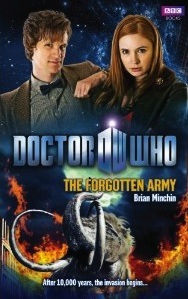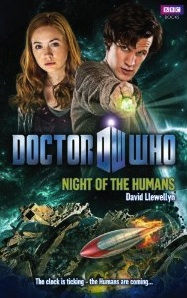I think it must be challenging to write TV and movie tie-in/spin-off novels. The author works within someone else’s parameters, cannot violate the canon and yet is not considered part of the canon. Though most of my reading falls outside of this type, I’ve read novels tied into Star Wars and Star Trek and, most recently, Doctor Who. Right about the time the second or third episode of the current Doctor Who series came out, I saw that there were already several Eleventh Doctor novels about to be released. I couldn’t help but wonder if they’d be good. As a viewer, I’d barely gotten to know Mr. Fish-Custard. Could writers convince me so quickly that they had an authentic rendition of him?
I presume the writers were given access to the entire season in advance and told what they could and could not reveal (in the books I mention below, the crack in the wall is not brought up and Rory barely gets mentioned). Even with advanced viewing, it can’t be easy to pull it off. The writer would need to bring out the pace and nuances of dialogue particular to Eleven and Amy before we as viewers have even developed a full sense of what that is. There’s also a genuine difference in the physicality of each Doctor. Nine felt a bit of a scrapper, not particularly graceful but a strong presence. Ten leapt back and forth from geeky tour guide to romantic adventurer with charisma and bravado. Eleven, so far, comes across a bit of a loony, with odd lurches and wiggly fingers. He looks unsettled.
I’ve now read two Eleventh Doctor books in the New Series Adventure line from BBC Books. They are The Forgotten Army by Brian Minchin and Night of the Humans by David Llewellyn. Both have written Doctor Who and Torchwood related material before.
It’s possible that these books were near-written even before the episodes were filmed, or Matt Smith cast, and then tailored to suit him. But it’s just as possible the writers are just damned quick. I believe it’s the latter; at least if that isn’t the case, I don’t want to be made aware of anything prefab in the story while reading.
 I don’t want to get into any spoilers, but in brief, The Forgotten Army is about the Doctor and Amy stopping an army of very small aliens attempting to steal modern-day Manhattan. They’re like the Sontarans, Liliput-style. Pretty ambitious little guys. The mighty Judoon only stole a hospital, after all. Night of the Humans tells of a distant (spatially and temporally) junk-heap called the Gyre, and the conflict between the rational Sittun race and wacko cargo-cult humans.
I don’t want to get into any spoilers, but in brief, The Forgotten Army is about the Doctor and Amy stopping an army of very small aliens attempting to steal modern-day Manhattan. They’re like the Sontarans, Liliput-style. Pretty ambitious little guys. The mighty Judoon only stole a hospital, after all. Night of the Humans tells of a distant (spatially and temporally) junk-heap called the Gyre, and the conflict between the rational Sittun race and wacko cargo-cult humans.
I enjoyed them both. In either case, they felt like Doctor Who stories, which is the most basic requirement, after all. They’d have made fine episodes, each better than “Victory of the Daleks”, but neither quite as gripping as “The Time of Angels/Flesh and Stone”.
Both books adequately, if lightly, differentiate the Eleventh Doctor’s physical differences from his predecessors, mainly by emphasizing his odd gait, bow tie and goofy hair. Llewellyn describes the Doctor’s smile as “a strange, inscrutable smile that took a second or two to reach his eyes.” Good description, that. I’ve seen Matt Smith smile in exactly that way several times, and it’s quite different than David Tennant’s big, bright jovial grin.
The Doctor’s dialogue in the last two incarnations has been rapid-fire. Despite looking and acting very little like each other, Smith and Tennant both deliver lines in a pretty manic pace, which makes it difficult to distinguish Ten and Eleven solidly in print. In these two books, there’s nothing wrong with the dialogue. It’s perfectly clever stuff. But I can’t say the lines pointed directly to Eleven. I could hear Smith or Tennant saying most of it. Amy, however, sounds nothing like Rose, Donna or Martha. She has far less romantic sentiment or reverence for the Doctor than Rose or Martha and less disdain and more silliness than Donna.
So, to sum up, the books are engaging, fun and non-essential reading for Doctor Who fans. They fit right into the Who universe without shaking it up or causing continuity errors. They feel enough like Eleven and Amy to satisfy my damn near ridiculous need for ever more Doctor.
When Jason Henninger isn’t reading, writing, juggling, cooking or raising evil genii, he works for Living Buddhism magazine in Santa Monica, CA










